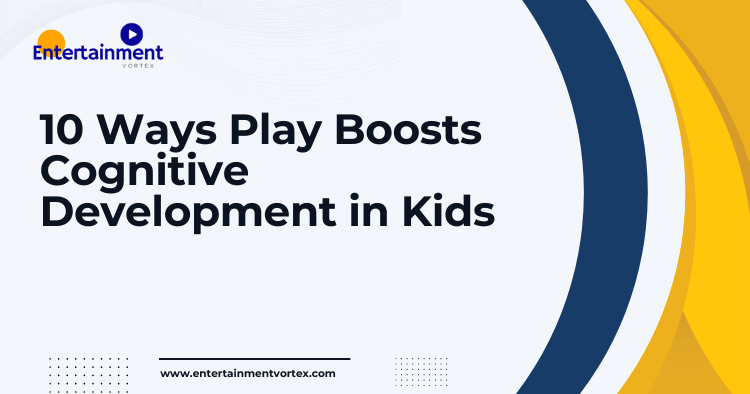Introduction
Play is often considered a child’s work, and for good reason! Engaging in play is not just about fun; it’s a vital component of cognitive development in children. It lays the groundwork for learning, creativity, and critical thinking. In this article, we will explore 10 ways play boosts cognitive development in kids.
1. Enhances Problem-Solving Skills
Problem-solving is a fundamental cognitive skill that children develop through play. When children engage in games that require strategy, such as puzzles or building blocks, they learn to evaluate their options, anticipate outcomes, and make decisions.
*For example, when a child is faced with a challenging puzzle, they must analyze different pieces and determine where they fit best. This active engagement promotes logical reasoning and critical thinking.*
Visual Element: Problem-Solving Skills Table
| Type of Play | Cognitive Skill Developed |
|---|---|
| Puzzles | Analytical thinking |
| Board games | Strategic planning |
| Role-playing | Adaptability and creativity |
2. Fosters Creativity
Creative play encourages children to express themselves freely. Activities like drawing, storytelling, and imaginative play stimulate their imagination and allow them to explore new ideas.
*When children create their own stories or scenarios, they learn to think outside the box, which is crucial for innovation and creativity in adulthood.*
Fun Fact
According to a study published in The Journal of Creative Behavior, children who engage in imaginative play show higher levels of creativity in various tasks. For more insights on fostering creativity, check out 10 Easy DIY Projects for Beginners to Spark Creativity.
3. Improves Memory
Play can significantly enhance memory retention in children. When children play games that require them to remember rules, sequences, or locations, they strengthen their memory skills.
*Games like Simon Says or Memory can help children improve their recall abilities and enhance their cognitive function.*
Visual Element: Memory Improvement Chart
| Game Type | Memory Skill Enhanced |
|---|---|
| Card games | Short-term memory |
| Hide-and-seek | Spatial memory |
| Simon Says | Working memory |
4. Encourages Social Interaction
Social play is essential for developing interpersonal skills. When children engage in group activities, they learn to cooperate, negotiate, and resolve conflicts.
*These interactions help them understand social cues and develop empathy, which are vital for their emotional and social well-being.*
Research Insight
A study from the American Psychological Association found that children who engage in cooperative play demonstrate greater social competence. If you’re looking for fun activities that promote social interaction, consider 10 Fun Hobbies to Enjoy Together with Your Kids.
5. Develops Language Skills
Play provides an excellent opportunity for language development. Engaging in role-playing or storytelling can enhance vocabulary and communication skills.
*Children learn new words and how to use them in context when they converse with peers during play.*
Language Development Activities
| Activity Type | Language Skill Developed |
|---|---|
| Storytelling | Vocabulary expansion |
| Role-playing | Conversational skills |
| Puppet shows | Narrative skills |
6. Promotes Emotional Intelligence
Through play, children learn to navigate their emotions and understand those of others. They can express feelings, develop empathy, and learn emotional regulation during various play scenarios.
*For instance, when children play house, they often role-play different emotions, which helps them process their own feelings and understand others better.*
For more activities that enhance emotional intelligence, explore 10 Essential Tips for Beginners in Knitting and Crocheting.
7. Boosts Focus and Attention
Engaging in play can improve a child’s ability to focus and concentrate. Activities that require sustained attention, like building with blocks or playing a board game, help children enhance their attention span.
*As they practice focusing on a task, they learn the importance of persistence and concentration, which are essential for academic success.*
8. Encourages Physical Coordination
Many types of play involve physical activity, which helps improve fine and gross motor skills. Activities like throwing a ball, climbing, or dancing enhance coordination and spatial awareness.
*These physical skills also have cognitive implications, as they promote brain development and the ability to perform complex tasks.*
Visual Element: Physical Coordination Skills Chart
| Activity Type | Coordination Skill Enhanced |
|---|---|
| Sports | Gross motor skills |
| Art (painting) | Fine motor skills |
| Dance | Rhythm and balance |
9. Teaches Planning and Organization
Planning is an essential cognitive skill developed through structured play. Children learn to set goals and strategize when they engage in team games or building projects.
*For example, when building a fort, children must plan how to gather materials, where to place them, and how to execute their vision, enhancing their organizational skills.*
Also, check out 10 Creative Ways to Turn Hobbies into Profitable Side Hustles for inspiration on how planning can lead to success.
10. Supports Executive Functioning
Executive functions are a set of cognitive processes that include working memory, flexible thinking, and self-control. Play helps develop these functions by requiring children to think critically and adapt to new challenges.
*Games that require turn-taking, such as board games, promote self-regulation and patience, which are vital components of executive functioning.*
Conclusion
Play is an integral part of childhood that significantly contributes to cognitive development. From enhancing problem-solving skills to promoting emotional intelligence, the benefits of play are far-reaching. Encouraging children to engage in various forms of play can pave the way for a brighter, more innovative future.
FAQs
Q: How much playtime should children have?
A: The American Academy of Pediatrics recommends that children have at least 60 minutes of unstructured play each day.
Q: What types of play are best for cognitive development?






